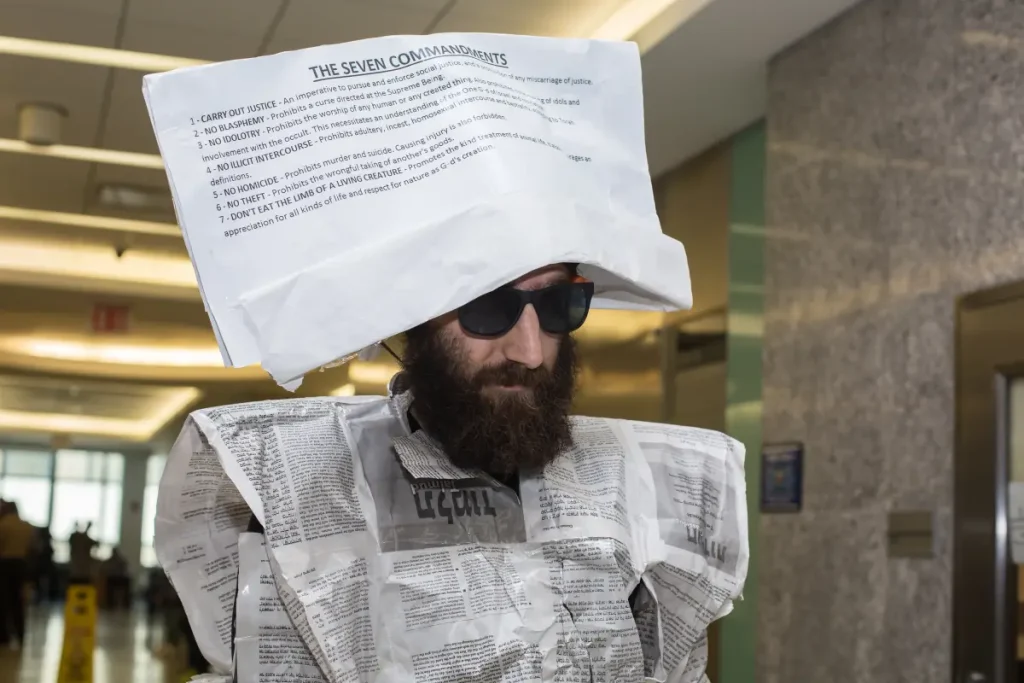Remembering Aaron Akaberi: The Unconventional Hero of Flatbush
Aaron Akaberi, a 39-year-old Brooklyn resident who died during Thursday’s severe flooding, was more than just a victim of the storm – he was a complex character known to many in his community for his religious devotion, eccentric behavior, and ultimately, his love for his animals. Once infamous as the “Torah Man” after appearing in Brooklyn Supreme Court in 2016 wearing an outfit made entirely of religious texts, Akaberi met his end while attempting to rescue his beloved pets from his flooded basement apartment on Kingston Avenue in Flatbush. “He had his whatever reputation, but he also saved his dog, that’s how he died,” reflected his neighbor Julia Tall. “He had a heart.”
Neighbors described Akaberi as an unconventional but friendly presence in the community. Having only moved into his basement dwelling last month, he had previously lived in a tent behind the building during the summer – just one of many quirks that defined his life. “He’s been in this community since I’ve been younger,” said a friend who identified himself only as Joe. “When he first came to Crown Heights, nobody was saying bad things about him.” Akaberi gained notoriety a decade ago when he appeared in court wearing what he called a “shirt” fashioned from newsprint pages covered in Hebrew writings of the late Lubavitcher Rebbe, Rabbi Menachem Mendel Schneerson, and a hat made from a printout of the original seven commandments given to Noah. This bold statement wasn’t merely for show – it was his way of protesting being banned from reading Talmudic quotations during a pre-trial hearing on drug charges. “The Judge wouldn’t let me read my ‘Chayenu’ in court, so I decided to wear it,” he declared at the time.
Behind his headline-grabbing antics, Akaberi was deeply committed to his faith. Joe described his friend as a ba’al teshuva – a secular Jew who returned to religious Judaism. “He was a devout Jew,” Joe explained. “He didn’t want to leave the area because he was devoted to the religion and the Rabbi.” This commitment manifested in his daily life: “He would do as best he can to do moral things, the moral mitzvot, the things that are moral commandments,” his friend recalled. “He was Chabad… If anybody told him a Jewish law, he would look it up and find out as fast as he can to keep it.” Evidence of his religious practices could be seen in his home – chickens wandered his backyard, brought home just after Yom Kippur, with one even hanging from the basement ceiling, likely part of a religious ritual.
The circumstances of Akaberi’s death reveal a man whose love for his animals ultimately cost him his life. As torrential rain flooded New York City on Thursday, he initially escaped his basement apartment with his mastiff Luna and cat Sparky. Instead of seeking safety, however, he made the fatal decision to return for his bully mix, Yala, and another cat named Chuki. Neighbors pleaded with him not to go back inside, recognizing the danger posed by the rapidly rising water. “I was like ‘Don’t go, Aaron! You saved one of the dogs already. Leave, don’t go back down there,’ and he pushed me out the way and went down there,” recounted a female neighbor who witnessed his final moments. Tragically, Akaberi never reemerged. After waiting anxiously and calling his name without response, neighbors realized he had become trapped in the flooded basement. Video footage later showed FDNY and scuba team members carrying his lifeless body from the building, still wading through ankle-high water in the street.
Akaberi’s death wasn’t the only tragic loss during Thursday’s devastating floods. Approximately 30 minutes after his body was recovered, Juan Carlos Montoya Hernandez, 43, was found unresponsive inside a flooded boiler room on West 175th Street in Washington Heights. Montoya Hernandez, who performed odd jobs for the building superintendent, apparently died from electrocution due to exposed wiring in the floodwater. “There was a loose wire in the water and he was electrocuted,” explained a tenant. Building superintendent Milton Mora discovered the body: “I went to the boiler room. The water was up to my knees. He was dead already when I walked in. I tried to pull him out. I got electrocuted, too. I’m lucky I’m alive… I don’t know how.”
These deaths remind us that beneath every headline and behind every public persona lies a full human being with complexities, contradictions, and connections. Aaron Akaberi, despite his eccentricities and past troubles, died trying to save creatures he loved – an act of selflessness that transcends any label or reputation. As his friend Joe indicated, there are “a lot of people saying all kinds of things” about Akaberi now, but his final act speaks volumes about his character. Similarly, Montoya Hernandez was remembered by those who knew him as “a good person” whom “everybody loved.” In the wake of this tragedy, perhaps what matters most is not the “Torah Man” costume or the odd jobs performed, but the human hearts that beat beneath – hearts that cared deeply for others, whether they walked on two legs or four.


